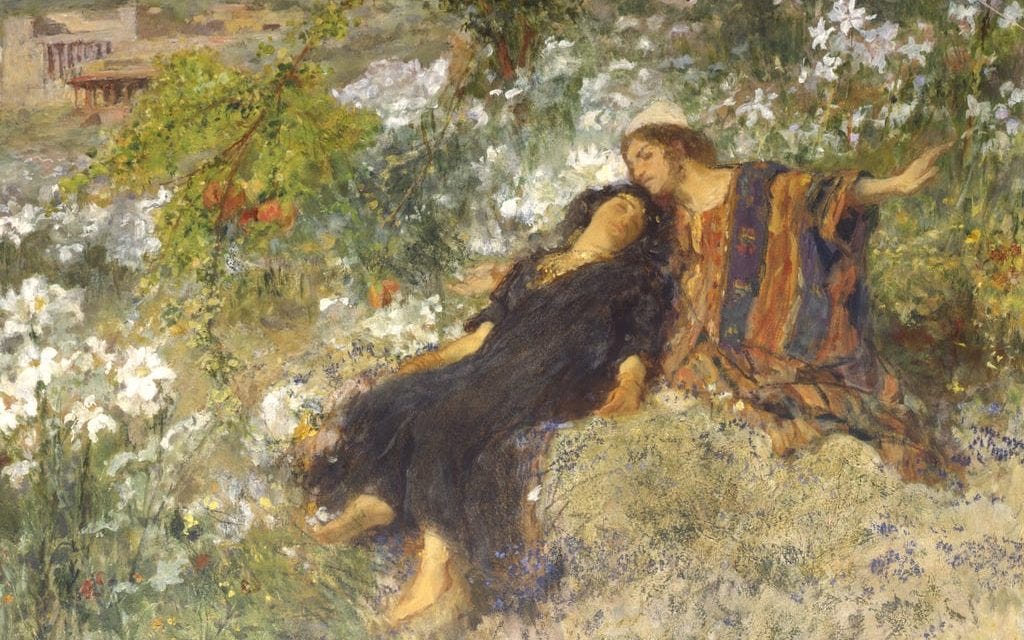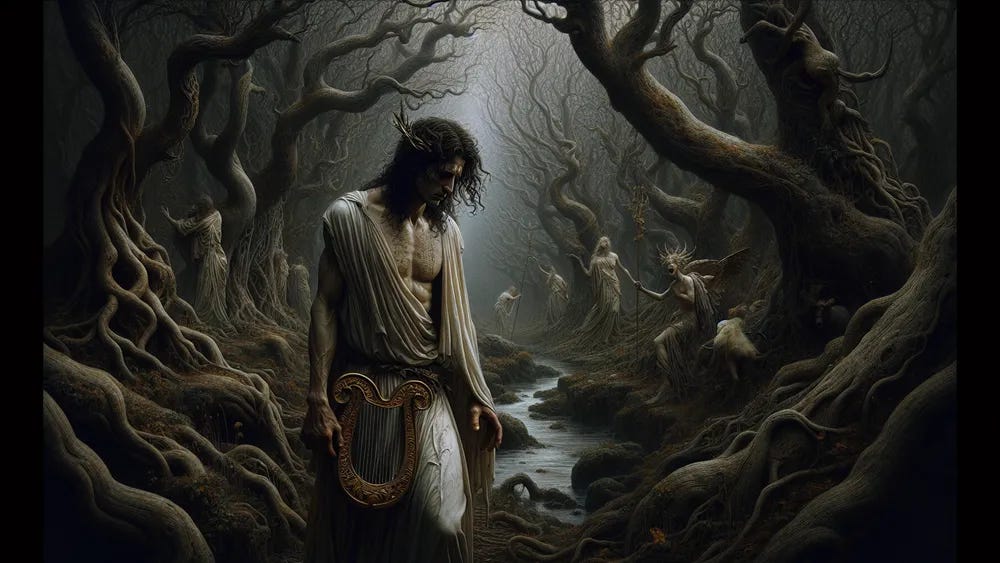If anything’s certain, it’s that marriage ain’t what it used to be. I can say this without recourse to divorce rate statistics or public figures who’ve muckraked so many valuable institutions. No: all you need to do is compare our talk of marriage now—with its talk of rights and benefits— with Spenser’s first, luminous stanza of his Epithalamion:
Ye learned sisters which have oftentimes
Beene to me ayding, others to adorne:
Whom ye thought worthy of your gracefull rymes,
That even the greatest did not greatly scorne
To heare theyr names sung in your simple layes,
But joyed in theyr prayse.
And when ye list your owne mishaps to mourne,
Which death, or love, or fortunes wreck did rayse,
Your string could soone to sadder tenor turne,
And teach the woods and waters to lament
Your dolefull dreriment.
Now lay those sorrowfull complaints aside,
And having all your heads with girland crownd,
Helpe me mine owne loves prayses to resound,
Ne let the same of any be envide:
So Orpheus did for his owne bride,
So I unto my selfe alone will sing,
The woods shall to me answer and my Eccho ring.
Imagine the poet, alone in the forest, awaiting his bride. We can see him in the woods, morning not far off, but for now, surrounded by thick, twisted darkness.
The image is not pastoral.
The mood is cautious, quiet, tentative.
The woods and waters are dark and deep, full of “doleful dreriment.”
We are outside human companionship, alone with life’s troubles.
And thus, to bolster his lonely spirits, the poet sings to the forest in the hope that:
“The woods shall to me answer and my Eccho ring.”
It is a refrain employed to close each stanza. Only later, once the poet and his bride have been joined does the poet feel comfortable in letting the woods go:
“The woods no more shal answere, nor your Echo ring.”
Let’s stay with the echo for a bit. An echo is fundamentally a paradox: a reminder of man’s essential loneliness in the world; a voice that tell you you are not alone. Here, the echo begins by reminding the speaker of his loneliness, but then the echo gets dropped once, from out of the nothing of the darkness of the forest, his companion emerges. The bride he has been waiting for. The answer to life’s loneliness.
Marriage, we forget, is the answer to man’s oneness.
To be one thing and one thing only is a terrible burden.
But it is not the case! Marriage creates two from one, and from those two, the rest fo the world is birthed into being.
Who on earth could write this way about marriage now in our day and age and get away with it? Popular culture sees marriage as a grown-up birthday party with booze and more cousins. Go to most modern marriages and it’s difficult knowing if the point of the thing is the union or the afterparty.
Not that I’m down on afterparties. Nor is Spenser. Nor is King Solomon. Nor is Jesus.
But it goes without saying that many modern marriages fail spectacularly in conveying the cosmic significance of the event. Two independent souls join in a union which produces (ideally) more independent souls.
Which is why in this marriage song, which Spenser wrote for his own bride, the poet marshals so much to his cause.
We begin with the sun: “his golden beame upon the hils doth spred.”
Then come the nymphs: forest-green, water-finned, fishy, frothy, feathered and light-footed. Nymph by the way comes from the Ancient Greek νύμφη meaning “bride:” an image that becomes progressively more beautiful the more you think on it.
Not only is all of creation haunted; the spirits that fill every moment of reality are also celebrating their wedding day.
Following this roundup, Spenser turns to the hours of the day:
“Come ye fayre hours which were begot
In Joves sweet paradice, of Day and Night,
Which doe the season of the yeare allot,
And all that ever in this world is fayre
Doe make and still repayre.”
This is easy to skim over—typical, mannered, Renaissance fluff—until you pause and reflect on just how different the Renaissance Weltgesicht was from ours.
To us moderns, we have inherited the idea that time is neutral—an immaterial clockwork upon which we print our actions and our will, or, under whom we labor and groan.
To Spenser, time is no mere neutral force—it is a created good. Why? Because that which is good acts in time. Through time things develop and mature, attaining and showing forth that fruitful sweetness that lights the world.
I imagine the hours as little distinct personalities. Five AM is a grandmotherly hour: quiet, gently gray, and meditative. Noon is an industrious businessman. Nine PM a wizened king.
Having invited these spirits to his nuptials, the poet then describes the ceremony with all attendant, liturgical ceremony. Comparisons are made to the sun, queens, and comely virgins. When the bride is described, the poet itemizes each detail:
Adornd with beautyes grace and vertues store,
Her goodly eyes lyke Saphyres shining bright,
Her forehead yvory white,
Her cheekes lyke apples which the sun hath rudded,
Her lips lyke cherryes charming men to byte,
Her brest like to a bowle of creame uncrudded,
Her paps lyke lyllies budded,
Her snowie necke lyke to a marble towre,
And all her body like a pallace fayre,
Ascending uppe with many a stately stayre,
To honors seat and chastities sweet bowre.
But marriage is not just limited to the persons of the bride and bridegroom. At its heart, marriage is the coming together of heaven and earth; God marrying the bridge of his Church; the joining of opposites which produces the world. Thus,
Open the temple gates unto my love,
Open them wide that she may enter in,
And all the postes adorne as doth behove,
And all the pillours deck with girlands trim,
For to recyve this Saynt with honour dew,
That commeth in to you.
And so we proceed to the marriage ceremony itself, the feasting and drinking in which even the Pagan gods have a part to play:
Poure out the wine without restraint or stay,
Poure not by cups, but by the belly full,
Poure out to all that wull,
And sprinkle all the postes and wals with wine,
That they may sweat, and drunken be withall.
Crowne ye God Bacchus with a coronall,
And Hymen also crowne with wreathes of vine,
And let the Graces daunce unto the rest;
For they can doo it best:
The whiles the maydens doe theyr carroll sing,
To which the woods shal answer and theyr eccho ring.
The woods echo back their praises, but it is not long before the party wearies. Night is coming. There is a tonal shift as the delights of day descend to the unknowns of the night. We emerge back where we started, in the forest of terrors.
Spenser does not let us forget that marriage is the cure to man’s loneliness, but not the cure of the broken world. Difficulties remain. There are terrors in the dark. Monsters waiting to devour us.
However, we are no longer alone. The marriage bower is now a fortress, a church which has been blessed and which can say to the darkness:
Let no lamenting cryes, nor dolefull teares,
Be heard all night within nor yet without:
Ne let false whispers, breeding hidden feares,|
Breake gentle sleepe with misconceived dout.
Let no deluding dreames, nor dreadful sights
Make sudden sad affrights;
Ne let housefyres, nor lightnings helpelesse harmes,
Ne let the Pouke, nor other evill sprights,
Ne let mischivous witches with theyr charmes,
Ne let hob Goblins, names whose sence we see not,
Fray us with things that be not.
Let not the shriech Oule, nor the Storke be heard:
Nor the night Raven that still deadly yels,
Nor damned ghosts cald up with mighty spels,
Nor griesly vultures make us once affeard:
Ne let th'unpleasant Quyre of Frogs still croking
Make us to wish theyr choking.
Let none of these theyr drery accents sing;
Ne let the woods them answer, nor theyr eccho ring.
And so the poet draws to his close. In lieu of many pearls and jewels—we might say, instead of the
$20,000 wedding video, the helicopter entrance, or the Four Seasons venue—the poet offers this song as a gift for the bride.
It doesn’t look like much, but we should remember: it wasn’t with jewels and cash the world was created, but with a word.






